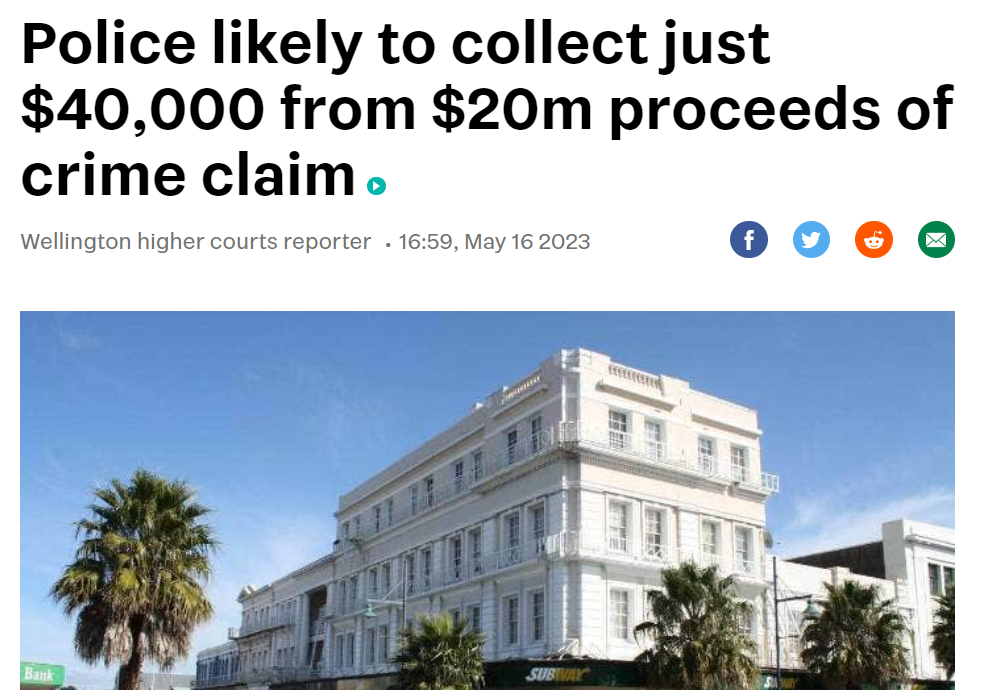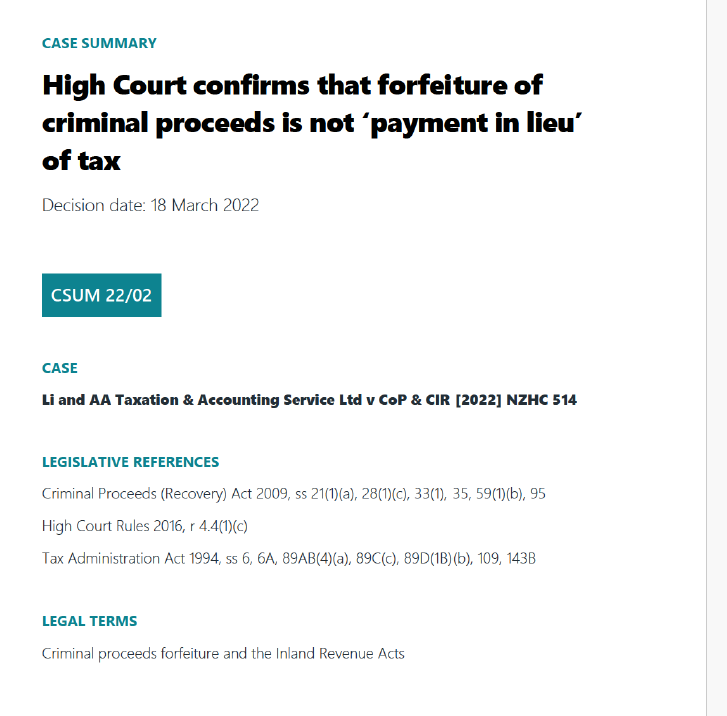IF YOU LIKE GIVING YOUR PROPERTY TO POLICE,
|
|
We have been test litigators since day one.
We do not advise a 'sit on your hands until forfeiture' approach. Why? This limits your options and the 'litigation environment' when it comes time to argue against forfeiture.
We fight for the underdog and we are flexible and agile in approach. We are accustomed to a big fight if necessary and we punch well and truly above our weight.
We do not advise a 'sit on your hands until forfeiture' approach. Why? This limits your options and the 'litigation environment' when it comes time to argue against forfeiture.
We fight for the underdog and we are flexible and agile in approach. We are accustomed to a big fight if necessary and we punch well and truly above our weight.
RECENT FEEDBACK 2023/2024
"Jessica asks the questions that [a veteran criminal senior silk] did not" - High profile criminal proceeds client (China and Auckland, 2023) in relation to property restrained in excess of $10M
"Amazing job" - Family of criminal proceeds client and specialist criminal barrister (Auckland, 2023) in relation to property restrained in excess of $200K
"Fighter... and the woman for the job" - High profile criminal proceeds family (Gisborne, 2023) in relation to property restrained in excess of $17M
"I did not understand her strategy at first and she doesn't really explain it when she is putting a plan together, but then some months later it all came together and I was like 'WOW!' She knows what she is doing. She works really differently to the other barrister I got advice from [senior criminal barrister]." - High profile client (Gisborne 2024) convicted of methamphetamine related offences.
PROCEEDS OF CRIME
|
"As counsel, and as a professional figure known to different categories of criminal proceeds litigants, I am increasingly consulted on large value or important proceeds matters. Sometimes I am consulted as counsel, sometimes I am consulted for out of court advisory, and sometimes I am sought for a second opinion. What is becoming clear to me is there is a demand for fresh talent, fresh minds, and creative defence in modern criminal proceeds cases. Doing nothing until forfeiture is old-school and unnecessary if you know what you are doing."
Jessica Matheson, June 2024. |
1. Services
|
Substantive litigation
Opposition to restraint Opposition to forfeiture Applications for severance of property interests Applications for exclusion of property on basis of undue hardship Judicial Review of Commissioner of Police's and his officers' powers under the Criminal Proceeds regime Judicial Review of the Official Assignee's powers under the Criminal Proceeds regime Out of Court Advisory Legal Opinions 'Shadow Counsel' Education/Information Negotiation Liaison with creditors/third parties With the Commissioner's lawyers Strategic Advocacy Services Coordinated advocacy (multi-targeted, in and out of Court, including social media) |
2. Legal Fees
|
Criminal proceeds is civil litigation. $490 + GST per hour, plus disbursements Fixed Fees may be available at my exclusive and sole discretion. Some litigants who do not qualify for legal aid find a fixed-fee-per-step helpful. Urgent criminal proceeds work will incur premium hourly rates between $550 to $800 per hour, depending on time, complexity, and the work I must drop to deal with your urgent matter. |
3. Large Criminal Proceeds Cases - assembling a team of barristers
|
For large value criminal proceeds matters, with multiple respondents and interested parties, and multiple party types (companies, trusts, individuals, children etc) it will be necessary to have multiple barristers acting for different parties. This is to avoid the appearance of conflict, but also actual conflict that may arise during the litigation. This also assists with a more manageable and safe workload for each barrister and their solicitor.
Ms Matheson indicates that if families, groups, clubs, or individuals wish for Ms Matheson to bring her strong, unique, and effective defensive approach to their criminal proceeds matter, that it is best Ms Matheson be allowed to assemble and 'lead' the team of barristers. It is best to contact us first, we can then assess the work and the number of barristers required. For senior barristers, we prefer a PQE (post qualification experience) of 20 to 35 years. Respectfully, we find creativity and innovation is not (generally) found in proceeds barristers at the 40PQE to 55PQE mark. |
4. Types of clients I have acted for/provided advice to
Companies
|
5. Proceeds of Crime Fund
Where does the money and property go if the Commissioner of Police is successful in having your property forfeited to the Crown?
https://www.justice.govt.nz/justice-sector-policy/about-the-justice-sector/proceeds-of-crime-fund/
https://www.justice.govt.nz/justice-sector-policy/about-the-justice-sector/proceeds-of-crime-fund/
6. Notable Achievements
2024
Updating soon....
|
2023
Commissioner of Police v T and J Location: Auckland Value of property: >$150K Application for restraining orders over more than $100K in cash notes that were seized as part of a large scale raid. In addition, the Commissioner sought a larger forfeiture order over assets of the First and Second Respondents. This was an Application made under the provisions of the new version of the Criminal Proceeds (Recovery) Act 2009. The Commissioner agreed not to pursue a forfeiture order against the First and Second Respondents. We acted for the First and Second Respondents. These clients were referred to Ms Matheson by a specialist criminal barrister. |
|
2023
Commissioner of Police v Z & Ors Location: Gisborne Value of property: >$17M Ms Matheson was instructed in 2022 to lead this large value litigation and assemble a litigation team. To date, Ms Matheson has achieved the following in this proceeding: 1. the inclusion of statements as to CHILDREN'S RIGHTS in an extension application judgment. 2. JOINDER of 2 minors to the proceeding (children are discretionary beneficiaries of a trust, but have interests additional to this) joinder is standard in civil litigation, but it has not been properly used in criminal proceeds matters in the past. 3. The complete REMOVAL of the lead detective's affidavit in reply. 4. The FIRST successful Application for Recall of a criminal proceeds Judgment. |
|
2023
Notable mention! Commissioner of Police v C & Ors Successful defence of an approximate $20M Profit Forfeiture Application Counsel assisting the Court: Mike Lennard Ms Matheson did not appear as counsel in this matter Ms Matheson's test criminal proceeds case Commissioner of Police v N (N) was cited by His Honour Justice Cooke as forming a case law basis on which the Commissioner of Police's Application for an approximate $20M Profit Forfeiture was dismissed. Ms Matheson argued the test case N, in lead counsel position, in 2021. In a nutshell, Ms Matheson said that the High Court needed to consider whether the benefit that one receives from the non-declaration of income upon which tax is not paid, is properly said to be a "criminal benefit" under the Act. Ms Matheson said what follows from the non-declaration of income was not a benefit as such, but merely a liability to the Commissioner of Inland Revenue. This argument stood the test of time and the High Court recognised the case as being the first in New Zealand history to consider the issue of 'double benefit' to the Crown i.e. The Commissioner of Inland Revenue and the Commissioner of Police are indivisible as 'the crown' for the purposes of the Act. We appreciate Her Honour Justice Duffy (as she was then) and her consideration of Ms Matheson's (unusual) arguments in 2021. With the benefit of hindsight, we can see Ms Matheson's arguments were 'ahead of her time'! |
Notable points in Judgment for litigants and counsel
|
|
2021
Commissioner of Police v N Location: Auckland Value of property: >$200K Ms Matheson conducted a rare substantive opposition to the Commissioner's On Notice Application for Restraining Orders over company and personal property. Our client argued that a criminal benefit needed to be shown by the Commissioner of Police as required under the Act, but there was no criminal benefit as defined from the alleged tax evasion, but merely a liability to the Commissioner of Inland Revenue. If there is no benefit from the criminal activity, then how can there be "proceeds" from crime? This argument is relevant when the money earned (that is subsequently not declare to the Revenue) comes from legitimate and lawful enterprise. However, the C case (above) appears to expand this, in that it may be that even if, say, fraudulent tax activity is a basis upon which a benefit is earned, then a corresponding tax debt/liability may negate any alleged benefit.... watch this space. All property of Ms Matheson's client was released by Police after the order for restraint was made, plus interest. |
The N case is cited in the above IRD Case summary.
| ||||||
|
2020
Commissioner of Police v N First time a resulting trust argument was used in New Zealand proceeds of crime case law history and first time it was done so successfully. Ms Matheson lead and crafted this argument. Location: Auckland Value of property released: <$20K Total value of property restrained: >$200K Release of vehicle on the basis of a resulting trust argument. Ms Matheson filed an Application for severance on the basis of beneficial title. Interested Party alleged his interest was a beneficial interest as a resulting trust beneficiary. On this basis, the respondent held only legal title as a resulting trustee. The argument put forward by Ms Matheson is complex and, as we understand it, may be the first time a resulting trust argument has been raised in this jurisdiction. This matter was settled, and the Commissioner released the vehicle promptly to the interested party. We caution self-represented litigants attempting to replicate this result. This kind of argument and litigation requires a civil specialist or at least a barrister with experience in trust litigation. Ms Matheson is always happy to assist, subject to engagement. |
















